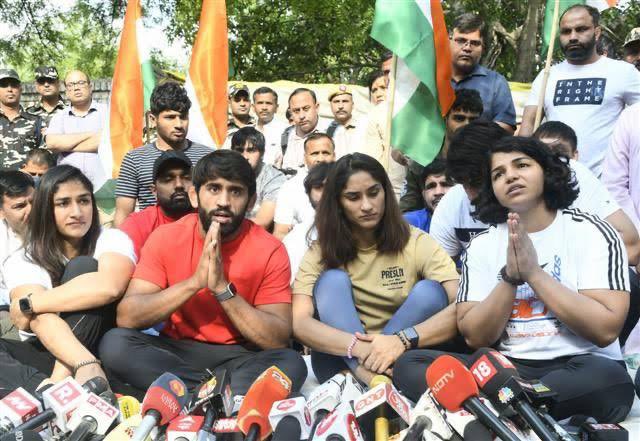
Wrestlers’ stir: In message of unity, Haryana's Khaps are entering the ring

Adding more heft to the on-going wrestlers’ stir against Wrestling Federation of India (WFI) chief Brij Bhushan Sharan Singh at Delhi’s Jantar Mantar, representatives and people associated with more than 50 khaps from Haryana have been arriving in the national capital since Sunday (April 23) in support of the wrestlers.
Top khap leadership has also called for a mahapanchayat to discuss strategies for the on-going protest. Khaps are rural councils, mostly of Jat communities, in Haryana and western Uttar Pradesh.
The wrestlers publicly welcomed the khaps to take part in the on-going protest after they received flak for not consulting the khaps before ending their earlier protest in January.
Also read: Wrestlers’ shame exposes BJP for what it is
Khaps and wrestlers
The political impact of this mobilisation is discernible. Jats in Haryana, led by the khaps, seem to be consolidating again and coming back to the centrestage of the state’s politics. This would not be good news for the Manohar Lal Khattar-led BJP-JJP government, which also faced ire of the community during the farmer’s agitation.
The reason khaps have got fully involved in the wrestlers’ stir is that it directly affects them. These wrestlers and other aspiring wrestlers are all from the same village and at times happen to be from the same family, explained Pratap Nambardar from Phogat Khap.
“This agitation is very different from other political agitations as it directly affects us,” he reiterated.
Khaps – about 90-odd in number — have considerable influence in districts of Rohtak, Gurgaon, Kaithal, Mahendragarh, Bhiwani, Jind, Hisar, Sonepat and Jhajjar.
Prominent khaps whose members have joined the protest are Phogat Khap, Sangwan Khap, Sheoran Khap, Boora Khap, Kandela Khap, Dhankar Khap, Jakhar Khap, Ahlawat Khap, Kadian Khap, Birohar-12, Sehrawat Khap, Hooda Khap, Rohtak Khap 84, Dahiya Khap, Gathwala Khap, Nandal Khap, Malik Khap, and Jhajjar 360 Khap.
The Satrol Khap has given a call that if the government does not ensure justice — in effect, the arrest of Brij Bhushan — its members would arrive in large numbers at Jantar Mantar and join the protest.
Rising above caste and religion
“The reason why the khaps are united is because it involves the daughters of India and the nation’s image is at stake,” said On Prakash Kandela.
Speaking to The Federal, Kandela, who heads Jind’s famous Kandela Khap, explained why there is an overwhelming support for the wrestlers. “The wrestlers belong to the entire nation and a ‘pehalwan’ has no religion, no region or caste,” he said.
“Our daughters have been endangered by a member of the ruling dispensation. We expected the government to come out in support of our daughters. Our daughters are being called liars in Delhi. Our daughters are sleeping on the pavements. We won’t tolerate this. The khaps will use their clout to create awareness and thereby dislodge the regime in Haryana. The government shouldn’t underestimate the power of khaps,” Kandela warned.
Focus on social issues
Pratap Dahiya, a leader from the Dahiya khap, feels that the recent efforts to focus on more contemporary and pressing social issues is in line with the clan-based groupings’ attempt to shed the image of being a hardline caste-based organisation.
Recalling the period when khaps were actively involved in state politics, Dahiya explained: “During the brief period when the body passed a resolution supporting a particular party or a candidate, it was an unwritten rule to all villages falling under the body’s control to vote accordingly. But over a period of time, khaps chose to not pass diktats for political support. This was done to keep the khaps united and debunk a popular theory that khaps don’t have much cohesion among themselves.”
The khaps are collaborating to mobilise crowds, organising material and delegating duties (during the wrestler’s protest) because the movement needs constant support, remarked Pratap Dahiya.
Apolitical in nature
Though khaps have generally refrained from directly participating in active politics, the khaps of Rohtak, Jhajjar, Sonepat and Bhiwani have traditionally been seen as supporters of the Congress.
Tajinder Dhankar, an important figure from Dhankar Khap, speaking to The Federal said: “Of late, we have seen many influential Jat leaders backed by khap groups shift to the BJP. This had led to the erosion of traditional party affiliation that the Jats had been following. But the wrestlers’ movement has energized the group as on numerous occasions now they have vowed to uproot the present dispensation in Haryana.”
“Although the khaps do not overtly engage in active politics… they are still powerful bodies and many political parties continue to nominate senior khap leaders for elections,” says Satyender Malik, from Gathwala Khap.
Also read: Protesting wrestlers hit back at WFI chief; Delhi Police provide security to complainants
He feels that political parties field khap leaders in elections as they wield power in more than one-fourth of the assembly seats. “Be it the BJP, Bahujan Samaj Party or the JJP, khap leaders are very popular among all these political outfits. Khaps, with their captive vote bank, are wooed by all political parties,” remarked Malik during an interaction with The Federal.
In fact, for more than a decade now, there has been a debate among khap panchayats about whether to remain apolitical or be actively involved in politics. Senior community leaders feel that a khap leader who joins politics is not able to command that kind of authority over half the members as compared to the one who has shown detachment from power.

